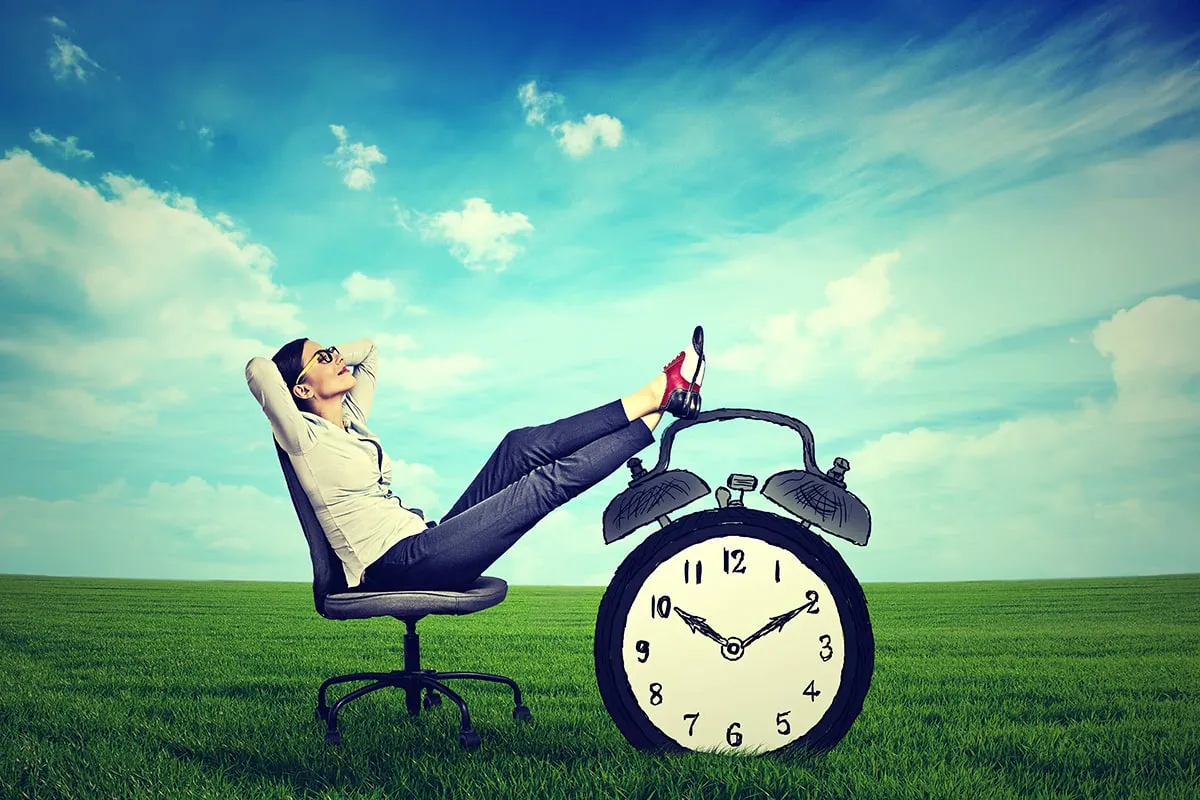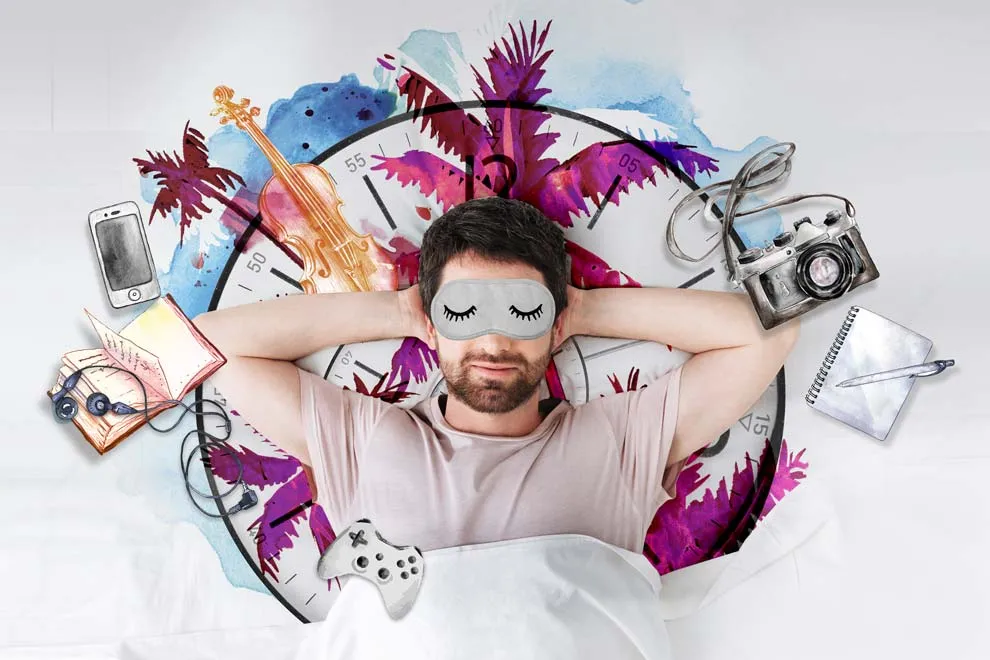Para ver la versión en español, haz clic aquí
Hey there, Hive!✨
Once again, I'll answer a question for the initiative of the month that I found quite interesting: Why is leisure time today a revolutionary act? Maybe for you it isn't such a thing, or maybe it is. Since it's a topic for debate, you can keep reading to find out my opinion.


In today's society, we are constantly bombarded with the idea that our value is measured by our productivity. From the moment we wake up until we go to bed, we are encouraged to be efficient, to learn new skills, to "make every minute count", even in our spare time. How many times, for example, do you log on to any social media platform and see an influencer sharing their daily routine that honestly seems (is) unreachable? They say they have to get up at 4:00 a.m. to workout, work, do chores, read, meditate, study, spend time with loved ones, etc., etc. Only to end the day as if nothing had happened and start over...
Revolutionary leisure, in this context, is a conscious rejection of that "logic". It is claiming the right to do nothing productive, to simply be, to enjoy for the mere pleasure of enjoying, without an ulterior motive of profit or improvement. It is an affirmation that human beings are not just production machines, and that the pressure to be so is not beneficial.

Well, you see, time is one of the most valuable and finite resources we have. In the modern age, much of our time is dictated by work demands and responsibilities. Long hours, the expectation of always being available (thanks to technology), and job insecurity leave us with little genuine time for ourselves.
Choosing leisure time is, then, an act of self-determination. It's taking control of our own time and deciding how we want to spend it, rather than having it dictated by external forces who supposedly know what we should do. In a society that constantly seeks to monetize every aspect of our existence, the time we dedicate to non-productive leisure time is, in essence, a space of freedom and personal sovereignty.

Understanding this, we see that from a psychological perspective, leisure time is not only important, but is considered a fundamental pillar for mental, emotional, and physical well-being. When we talk about leisure time as a "revolutionary act" from this perspective, we see how it challenges current societal norms that, paradoxically, can be detrimental to our psychological health.
As I mentioned before, we live in a culture that glorifies constant productivity and 24/7 availability. This generates high levels of stress, anxiety, and, in extreme cases, burnout syndrome. This is where the importance of quality leisure time comes in, allowing us to disconnect from daily pressures, reduce levels of cortisol (the stress hormone), and recharge our emotional reserves. Pleasurable, non-obligatory activities act as a release valve, helping to process and release accumulated tension.
When we're constantly busy with structured tasks, our brains tend to operate in a convergent thinking mode (focused on finding a single solution). Leisure, especially unstructured or "boring" leisure, allows the mind to wander, to make new connections and see things from a different perspective.

Moments of spare time or recreational activities also free the mind for reflection, introspection, and the connection of seemingly unrelated ideas. This is crucial for creativity and innovation, both personally and professionally. By allowing us to explore freely, leisure time fosters divergent thinking—the ability to generate multiple solutions to a problem or see things from different perspectives.
And from a critical psychological perspective, the constant pressure to be productive is not only unsustainable, but can also be pathological. It generates anxiety about "not doing enough", guilt about resting, and self-demanding behavior that can lead to mental health problems. Therefore, consciously choosing leisure time, rest, or non-productive activities is an act of psychological resistance against this dominant narrative. It is an affirmation that our value as human beings is not tied solely to our ability to produce or be efficient. Revolutionary leisure, then, is a search for psychological balance in an unbalanced world. It is the affirmation that we have the right to spaces of non-doing, of enjoying, of simply being, for our own health and well-being.
Thus, in a world obsessed with productivity, consumption, and efficiency, taking time for genuine, unstructured, and non-productive leisure becomes an act of resistance. It is a declaration of personal independence and a way to redefine what it means to be human outside the dictates of the dominant system.




Español
¡Hola, Hive!✨
Nuevamente contestaré a una pregunta para la iniciativa del mes que encontré bastante interesante: ¿Por qué el ocio hoy es un acto revolucionario? Quizás para ti no es tal cosa, o puede que sí. Como es un tema para debatir, puedes continuar leyendo para conocer mi opinión


En la sociedad actual estamos constantemente bombardeados con la idea de que nuestro valor se mide por nuestra productividad. Desde que nos levantamos hasta que nos acostamos, se nos incita a ser eficientes, a aprender nuevas habilidades, a «hacer que cada minuto cuente», incluso en nuestro tiempo libre. Cuántas veces, por ejemplo, entras a cualquier red social y aparece algún influencer compartiendo su rutina diaria que sinceramente parece (es) inalcanzable; diciendo que debes levantarte a las 4:00am a hacer ejercicio, trabajar, hacer quehaceres, leer, meditar, estudiar, pasar tiempo con seres queridos, etc, etc. Para terminar el día como si nada y volver a empezar...
El ocio revolucionario, en este contexto, es un rechazo consciente a esa «lógica». Es reclamar el derecho a no hacer nada productivo, a simplemente ser, a disfrutar por el mero placer de disfrutar, sin un objetivo ulterior de ganancia o mejora. Es una afirmación de que los seres humanos no somos solo máquinas de producción, y que la presión de serlo no es beneficiosa.

Pues verás, el tiempo es uno de los recursos más valiosos y finitos que tenemos. En la era moderna, gran parte de nuestro tiempo está dictado por las exigencias laborales y las responsabilidades. Horarios largos, la expectativa de estar siempre disponible (gracias a la tecnología), y la precarización laboral nos dejan con poco tiempo genuino para nosotros mismos.
Elegir el ocio es, entonces, un acto de auto-determinación. Es tomar el control de nuestro propio tiempo y decidir cómo queremos gastarlo, en lugar de que sea dictado por fuerzas externas, quienes supuestamente saben lo que deberías hacer. En una sociedad que constantemente busca monetizar cada aspecto de nuestra existencia, el tiempo que dedicamos al ocio no productivo es, en esencia, un espacio de libertad y soberanía personal.

Entendiendo esto, vemos que desde la psicología, el ocio no solo es importante, sino que se considera un pilar fundamental para el bienestar mental, emocional y físico. Cuando hablamos de que el ocio es un «acto revolucionario» desde esta perspectiva, vemos cómo desafía las normas actuales de la sociedad que, paradójicamente, pueden ser perjudiciales para nuestra salud psicológica.
Como mencioné antes, vivimos en una cultura que glorifica la productividad constante y la disponibilidad 24/7. Esto genera altos niveles de estrés, ansiedad y, en casos extremos, el síndrome de burnout (agotamiento profesional). Aquí es cuando entra la importancia del ocio de calidad, que nos permite desconectar de las presiones diarias, reducir los niveles de cortisol (la hormona del estrés) y recargar nuestras reservas emocionales. Actividades placenteras y no obligatorias funcionan como una válvula de escape, ayudando a procesar y liberar la tensión acumulada.
Cuando estamos constantemente ocupados con tareas estructuradas, nuestro cerebro tiende a operar en un modo de pensamiento convergente (enfocado en encontrar una única solución). El ocio, especialmente el no estructurado o «aburrido», permite que la mente divague, que llegue a hacer nuevas conexiones para ver las cosas desde una perspectiva diferente.

También los momentos de inactividad o actividades recreativas liberan la mente para la reflexión, la introspección y la conexión de ideas aparentemente no relacionadas. Esto es crucial para la creatividad y la innovación, tanto en lo personal como en lo profesional. Al permitirnos explorar libremente, el ocio fomenta el pensamiento divergente, es decir, la capacidad de generar múltiples soluciones a un problema o de ver las cosas desde diferentes perspectivas.
Y desde una perspectiva psicológica crítica, la constante presión para ser productivos no solo es insostenible, sino que también puede ser patológica. Genera ansiedad por «no hacer lo suficiente», culpa por descansar y una autoexigencia que puede llevar a problemas de salud mental. Es por ello que elegir conscientemente el ocio, el descanso o actividades no productivas es un acto de resistencia psicológica contra esta narrativa dominante. Es una afirmación de que nuestro valor como seres humanos no está ligado únicamente a nuestra capacidad de producir o de ser eficientes. El ocio revolucionario, entonces, es una búsqueda de equilibrio psicológico en un mundo desequilibrado. Es la afirmación de que tenemos derecho a espacios de no hacer, de disfrutar, de simplemente ser, para nuestra propia salud y bienestar.
De este modo, en un mundo obsesionado con la productividad, el consumo y la eficiencia, tomarse tiempo para el ocio genuino, no estructurado y no productivo, se convierte en un acto de resistencia. Es una declaración de independencia personal y una forma de redefinir lo que significa ser humano fuera de los dictados del sistema dominante.


